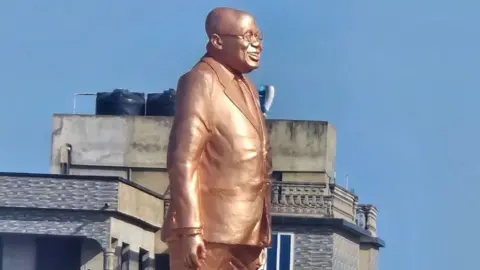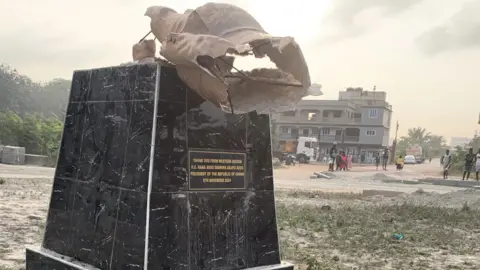A statue of Ghana’s former President, Nana Akufo-Addo, erected late last year, has been destroyed.
The statue, unveiled by Akufo-Addo himself in November in the Western Region, drew backlash on social media, with many mocking it and labeling the act as “self-glorification.” It had been inaugurated to honor the president’s contributions to development during his tenure.

On Monday, local media circulated images showing the statue in ruins, with its severed head lying on the ground. The torso was also destroyed, leaving only a damaged pedestal. The police have not commented on who might be responsible or the motive behind the act.
Justice Gaisie, the sculptor, revealed that the statue was constructed using materials such as metal, wire mesh, clay, fiberglass, and resin.

Akufo-Addo concluded his presidency last week after two terms. His party’s candidate was decisively defeated in December’s presidential election.
The statue had already been partially vandalized last month, with one leg damaged. At the time, some residents had called for its removal, but local authorities had promised to repair it instead.
The destruction of the statue has sparked mixed reactions. While some residents expressed satisfaction, others criticized the approach taken. One individual told Citi FM that the statue “was of no benefit” to the people, so its destruction “is normal.” Another called for a more “civil approach” to its removal, warning of potential backlash for supporters of the former president’s party.
Joy FM quoted another resident expressing happiness over the statue’s destruction.
Last year, critics questioned the use of public funds for its construction amid Ghana’s severe economic hardships. The country, facing its worst economic crisis in decades, secured a $3 billion bailout from the International Monetary Fund (IMF).
The cost-of-living crisis played a significant role in last month’s election, where President John Mahama won by a landslide. Mahama had previously criticized the statue’s erection, arguing that such honors should come from the people and labeling it insensitive considering the economic struggles of ordinary Ghanaians.



